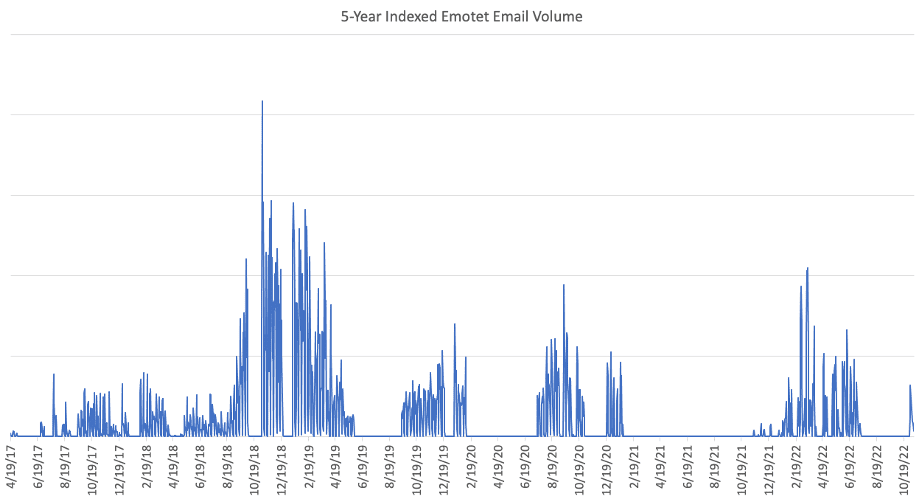The Emotet malware is back and experts warn of a high-volume malspam campaign delivering payloads like IcedID and Bumblebee.
Proofpoint researchers warn of the return of the Emotet malware, in early November the experts observed a high-volume malspam campaign delivering payloads like IcedID and Bumblebee.
The Emotet banking trojan has been active at least since 2014, the botnet is operated by a threat actor tracked as TA542.
The infamous banking trojan was also used to deliver other malicious code, such as Trickbot and QBot trojans, or ransomware such as Conti, ProLock, Ryuk, and Egregor.
In April, the operators of the infamous Emotet botnet started testing new attack techniques in response to Microsoft’s move to disable Visual Basic for Applications (VBA) macros by default.
In June, Proofpoint experts spotted a new variant of the Emotet bot that uses a new module to steal credit card information stored in the Chrome web browser.
Over time, Emotet operators have enhanced their attack chain by employing multiple attack vectors to remain under the radar.
The Emotet operators remained inactive between July and November 2022.
Threat actors were spotted distributing hundreds of thousands of emails per day, this activity suggests Emotet is returning to its full functionality acting as a delivery network for major malware families.
The experts noticed multiple changes to the bot and its payloads, and the operators introduced changes to the malware modules, loader, and packer. Below are the changes observed by Proofpoint:
New Excel attachment visual lures
Changes to the Emotet binary
IcedID loader dropped by Emotet is a light new version of the loader
Reports of Bumblebee dropped in addition to IcedID
“The volume of emails that Emotet sending bots attempt to deliver each day is in the hundreds of thousands. These numbers are comparable to historic averages. Hence, it does not appear that the Emotet botnet lost any significant spamming capability during the inactive period.” reads the report published by Proofpoint.
The wave of attacks observed by the security firm primarily targeted the U.S., the U.K., Japan, Germany, Italy, France, Spain, Mexico, and Brazil.
The emails observed in recent attacks typically used a weaponized Excel attachment or a password-protected zip attachment containing an Excel file inside. The Excel files contain XL4 macros that download the Emotet payload from several (typically four) built-in URLs.
The novelty of the Excel files used in recent campaigns is that they contain instructions for recipients to copy the file to a Microsoft Office Template location and run it from there instead. This location is “trusted,” which means that opening a document located in this folder will not display any warnings.
“However, while moving a file to a template location, the operating system asks users to confirm and that administrator permissions are required to do such a move.” observed the experts. “It remains unclear how effective this technique is. While there is no longer a need for users to enable macros with an extra click, there is instead a need to perform a file move, acknowledge the dialog, and the user must have Administrator privileges.”
The Emotet variant employed in recent attacks supports new commands, has a new implementation of the communication loop, uses a new check-in packet format, and a new packer.
Currentt version of the bot supports 5 commands:
1 – Update bot
2 – Load module
3 – Load executable
4 – Load executable via regsvr32.exe
16343 – invoke rundll32.exe with a random named DLL and the export PluginInit
The last two were added to the latest version of the botnet.
“Overall, these modifications made to the client indicate the developers are trying to deter researchers and reduce the number of fake or captive bots that exist within the botnet. The addition of commands related to IcedID and the widespread drop of a new IcedID loader might mean a change of ownership or at least the start of a relationship between IcedID and Emotet.” concludes the report.
Follow me on Twitter: @securityaffairs and Facebook and Mastodon
(SecurityAffairs – hacking, Moshen Dragon)
The post Emotet is back and delivers payloads like IcedID and Bumblebee appeared first on Security Affairs.
Leer másSecurity Affairs
Views: 0




















































